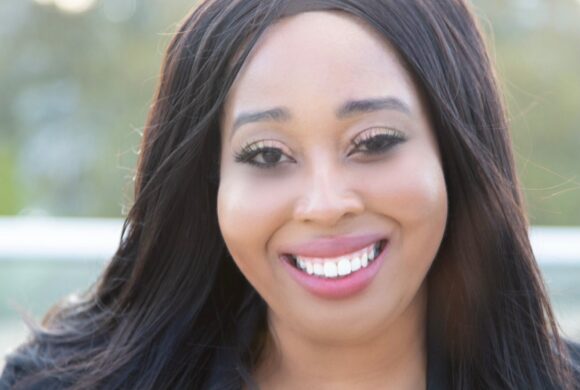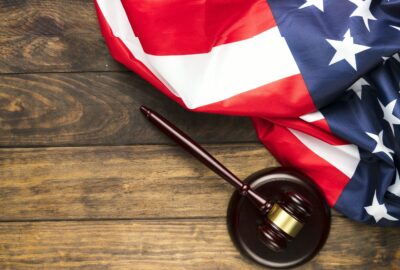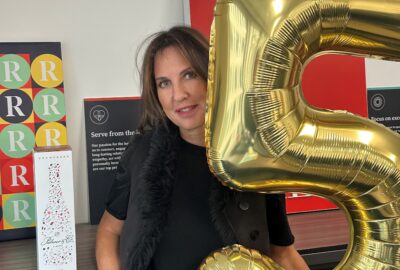
Jacqui Rhule-Dagher is an associate at Hogan Lovells International LLP and is a trailblazer for the LGBTQIA community, particularly within the law profession. She is also a member of The Law Society’s LGBTQ+ Solicitors Network. In April 2023, Jacqui featured on the DIVA Power List and was named on the Empower 100 Future Leaders Role Model List which celebrates ethnically diverse advocates across global organisations. But her road to living her authentic self hasn't always been plain sailing. To mark Pride month, Jacqui has supported us with an extremely open, honest and thought provoking Spotlight interview about her life as a Black lesbian lawyer.
You are becoming increasingly known for championing the rights of the LGBTQIA community, but you haven’t always been comfortable embracing your identity as a Black lesbian lawyer. What or who finally gave you the confidence to start living as your authentic self?
I think that some context is important, so let me briefly set the scene of my LGBTQIA legal journey.
When I first entered the legal industry, I was so deep in the closet that I could have been mistaken for Aslan from The Lion, The Witch and The Wardrobe - with hair to rival his! My Monday morning routine typically consisted of rehearsing lines on the tube to the much-dreaded question: “What did you do at the weekend?” I was terrified that I might out myself if I revealed too much. One day, I slipped up, and mentioned that I had been to the Dalston Superstore (a well-known LGBTQ+ club). Well, you can imagine my relief when my colleague thought that I was a DIY enthusiast!
I want to stress that my fear did not come from my working environment, but rather from a lack of lesbian representation in the legal industry, more generally. When I started my training contract at Clifford Chance I had the pleasure of meeting and working with other lesbian lawyers, and this was a life-affirming and game-changing experience for me.
It was also around this time that I was introduced to the theoretical framework of intersectionality. The term intersectionality, coined by Professor Kimberlé Crenshaw in 1989, is used to describe how people can be discriminated against based on their intersecting identities. These identities include age, race, class, gender identity and sexual orientation. For example, I may experience homophobia differently to a white lesbian by virtue of my race; and I may experience racism differently to a Black man by virtue of my gender. Intersectionality recognises that characteristics do not operate in silos, and that there are real, complex people behind them.
I am also very lucky that there are two out lesbian partners (that I know of) at Hogan Lovells International LLP, in the London office, where I am an associate.
So meeting other lesbian lawyers, and developing my understanding of intersectionality, has helped enormously in terms of me being able to live and work authentically.
The Equalities Act 2010 states that there are nine protected characteristics: age, disability, gender-reassignment, marriage and civil partnership, pregnancy and maternity, race, religion or belief, sex or sexual orientation.
Have you ever encountered any specific biases or prejudices in the legal profession based on one, or more, of your protected characteristics? How do you address or challenge those biases?
Sadly, yes. Two incidents stand out. Many years ago, just before the Christmas holidays, I was listening to some music in the office and the person I shared a room with asked if I was listening to “Hip Hop Christmas carols”? I was actually listening to the pianist, Sergei Rachmaninoff.
Not long after this incident, two colleagues were having a conversation and one of them said:
“I probably should not say this, but that is so gay”. The other person responded by saying: “Don’t worry, it is fine to use the word gay pejoratively.” They both knew that I was a lesbian.
I remember back in 2016, the MP for Brent, Dawn Butler, entered a lift and was told “This lift really isn’t for cleaners.” I remember thinking at the time was this said to her because she is Black, or because she is a woman, or was it down to a combination of the two.
So one of the biggest challenges of existing at multiple intersections is that it is not always easy identifying which of your characteristics has been discriminated against.
Another challenge is the way people view these interactions. These encounters are examples of microaggressions, a term that has always made me laugh because the impact is often anything but small (people seem to focus on the “micro” part and forget the “aggression” element).
These every day, subtle, intentional, and sometimes unintentional interactions, communicate biases towards historically marginalised groups. One of the main differences between microaggressions and overt discrimination, and a big part of the challenge, is that people who commit the microaggressions might not even be aware that they are doing so.
In terms of addressing problematic comments, behaviours and microaggressions, it really depends on the circumstances. For example, you are likely to adopt a different approach if you are speaking to a peer as opposed to a partner. I don’t advocate for one-size fits all solutions. I think, however, that in a number of cases simply saying “that made me uncomfortable” is a firm, yet polite and highly effective way of telling someone that their behaviour/ language is inappropriate.
Jacqui, you’re making a huge impact within the Diversity, Equity and Inclusion (D,E&I) space having been recognized as one of the Top 10 Future Leaders by the British LGBT Awards, being shortlisted for the Diversity Champion of the Year Award by DIVA, and being awarded ‘highly commended’ for the Financial Times Corporate LGBTQIA Champion of the Year by the Bank of London, Rainbow Honours Awards in May.
What difference does it make to members of the LGBTQ+ community perhaps struggling to come out, to have visible role models like you in the legal industry?
First, I should stress that while it is an immense honour and privilege to be nominated for awards, especially alongside so many people that I respect and admire, nominations and awards are not what motivates me. My motivation is to be the person for others that I needed to see when I first entered the legal industry. I appreciate, however, that when you are nominated/ win awards you are likely to become more visible, and so have the ability to help/ inspire a great many more people.
Having visible role models has been hugely helpful for me. I do not think it is a coincidence that I became more open about my sexuality when I started working with other out lesbian lawyers at Clifford Chance. Prior to starting at Clifford Chance, I was also very lucky to be put in contact with a senior associate, at another firm, who assured me that her experiences of being visibly out had been overwhelmingly positive. Her words gave me hope. She is now a partner at the same firm, and happily, we’re still in touch.
Visibility is vital. If you don’t meet people like you, you can start to think that there is something wrong with you, as I did. While I don’t consider myself to be a role model, if seeing me makes someone’s coming out journey that bit easier, or enables them to bring their authentic self to the workplace, then this can only be a positive thing, and something I welcome wholeheartedly.
Apart from the awards nominations, can you share any significant accomplishments or milestones that have positively impacted the LGBTQIA community, or especially in relation to racial diversity in the profession?
When I first entered the legal industry, it would have made a huge difference for me to see a diverse range of lesbian lawyers. With this mind, in April 2023, I founded Legally Lesbians. Here, 25 lesbian lawyers wrote about their careers and why lesbian visibility is important. In a nice full circle moment, the senior associate who helped me all of those years ago, took part in the initiative. Legally Lesbians was supported by the world’s leading LGBTQIA publication for women/ non-binary individuals, DIVA Magazine.
I am also a member of The Law Society’s LGBTQ+ Solicitors Network. Last year, The Law Society profiled me for its Pride series. I also had the honour of marching in the 50th Anniversary Pride March on behalf of The Law Society.
In terms of racial diversity, in October 2022, The Law Society profiled me during Black History Month. This publication went out to thousands of lawyers.
In May 2023, I was named on the Empower 100 Future Leaders Role Model List supported by YouTube. These lists celebrate ethnically diverse Executives, ethnically diverse Future Leaders and Advocates for ethnically diverse talent across global organisations.
It was extremely humbling to be recognised in this way, but more importantly, I hope that by seeing me profiled by The Law Society, and by being on the Empower 100 Future Leaders Role Model list, more people will have the confidence to bring their authentic self to the workplace.
What advice do you have for aspiring legal professionals who may be hesitant to embrace their authentic selves?
I would say that you have to do what is right for you. I would love to say “come out and embrace your authentic self”, but for a multitude of reasons this is not always possible. If coming out puts you in physical and/or psychological danger, then it would be irresponsible of me to advocate for this. I recognise that living and working as my authentic self is an enormous privilege, which I don’t take for granted.
If, however, it is possible to bring your whole self to the workplace, then I can say with complete certainty that I am much happier now that I am not expending energy rehearsing lines on the tube and hiding my sexuality. Significantly, I can focus completely on my work, because while I am wholeheartedly committed to DE&I, being the best lawyer that I can be is of paramount importance to me. Lawyers who are part of the LGBTQIA community have so much more to them than their LGBTQIA identity.
DE&I is high on the agenda for all law firms. How does Hogan Lovells ensure that inclusivity is at the heart of their culture and it’s not just a tick box exercise?
Hogan Lovells understands that DE&I makes them a better law firm and helps the firm to attract the best talent, drive innovation and deliver the best experience for our clients. The firm’s DE&I strategy is built around five pillars: Accountability, Processes, Recruitment and Retention, Culture and Clients. So delivering on commitments to DE&I is actually a strategic priority of the firm, on par with putting our clients at the heart of everything we do.
The firm also has six engaged and inclusive networks in the UK. Our networks support the implementation of the firm’s strategy to drive recruitment, retention, progression and inclusion of those from underrepresented backgrounds. I am a member of the race and ethnicity network and I sit on the steering committee of the LGBTQ+ network. The other networks are focused around gender equality, working families, faith and culture, generational diversity and social mobility. These groups are for members of the communities they represent, as well as allies. Significantly, there is strong representation from senior leadership across them.
Everyone in the firm is encouraged to contribute to DE&I; and to encourage this, as well as to ensure that lawyers from underrepresented groups are credited for often undertaking the bulk of DE&I activities, the firm has introduced a chargeable hour credit for DE&I hours.
I must say, I feel very grateful that I am part of an organisation where I can be visibly and happily out.
If law firms were to do just one thing to improve inclusivity of the recruitment, retention and advancement of underrepresented minorities within the profession, what would that be?
I would say develop a greater understanding of intersectionality.
To quote the late and great Audre Lorde: “There is no such thing as a single-issue struggle because we do not live single-issue lives.” A good starting point, in this respect, is to ensure that employee networks do not operate in silos. Oftentimes, you will find that a firm has an LGBTQIA network, a race and ethnicity network and a women’s network, for example. Notwithstanding, rarely, if ever, do these networks interact/ collaborate. I think this is a missed opportunity.
When I started as a trainee solicitor, I joined the BME network and the firm’s LGBTQ+ network, Arcus. The networks seldom interacted. It quickly became apparent, however, that in a number of instances, both networks were striving towards similar goals. With this in mind, I founded “Carnival Comes to Clifford Chance”. This was an annual summer party, hosted jointly by both networks, which had an intersectional focus. One year, Channel 4 supported the event. It is pleasing that the initiative is still running.
So I would encourage networks to collaborate whenever possible.
Who has been the biggest inspiration in your life?
I have two. First, my mother. She is the bravest, funniest, kindest, smartest and wisest person that I know. I take my position as her only child very seriously.
Secondly, an IP partner at Freshfields. I have known her for a long time, and she has always been the most wonderful mentor and sounding board for me. Ostensibly, we could not be more different. Yet some of my best conversations, and fondest memories, have involved her.
She’s also a longstanding active ally to the LGBTQIA community and she genuinely cares about deepening her understanding of issues affecting the LGBTQIA community. She actually introduced me to her friend, the lesbian senior associate, all of those years ago, who assured me that most people would not care about my sexuality.
I owe this partner a debt of gratitude far greater than she would ever claim, or I will ever know.
With all the knowledge and experience you have now gained, what would you go back and tell your 14-year old self?
I would tell her that you can be a thousand things, but none of them matter if you aren’t being yourself. You might not have as many relationships as your heterosexual peers, due to bigotry and homophobia, but the relationships that you do have will be deeper, more meaningful and impactful because you are being yourself. Also, whenever you question whether being visible is the right thing to do, remember that by being visible you will be living by the words of your hero, Maya Angelou, who said: “Be a rainbow in someone else’s cloud.”
Finally, if you could meet anyone, alive or dead, who would it be and what one question would you ask?
Back in February, I visited the Stonewall Inn, in New York. It was a very special and moving experience, and served to remind me that the LGBTQIA community truly stands on the shoulders of giants. One of the bartenders confirmed that the police would regularly raid the inn and arrest people, so what initially happened on the 28 June, 1969, was not shocking.
So my question would be for Marsha P. Johnson and I would ask: “Who or what gave you the strength to resist arrest on the night of 28 June, 1969?


